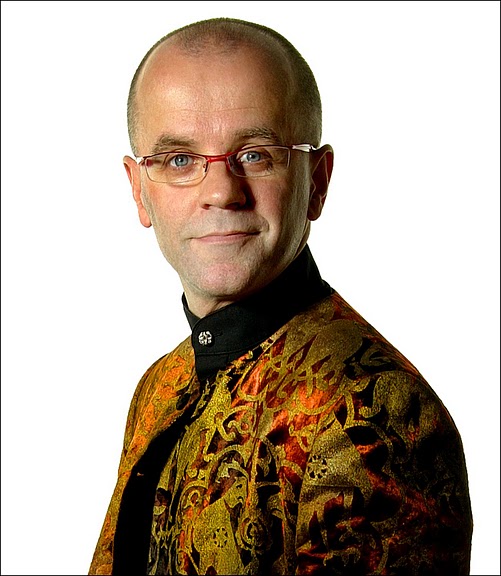Grant Park Chorus serves up illuminating program of American music

Christopher Bell led the Grant Park Chorus in a program of American music Tuesday night at the Harris Theater.
American classical repertoire is, at best, a sometimes thing at most Chicago institutions, yet the Grant Park Music Festival can be relied upon to offer a discerning and offbeat selection of homegrown music.
This summer’s Grant Park symphonic repertoire is strangely light in that regard, but director Christopher Bell and the Grant Park Chorus made up the balance neatly with the program of American choral music presented Tuesday night at the Harris Theater.
As with The Pulitzer Project — the Grant Park Orchestra and Chorus’s superb, just-released disc of American works — these choral concerts are also being recorded for release on the Cedille label.
Carlos Kalmar made a rare off-night stage appearance to introduce his colleague, and Bell’s witty and engaging introductions to the works set just the right welcoming note. His good-humored admonition for respectful audience quiet clearly paid off; the hushed atmosphere and delayed applause should mean minimal patching sessions for this recording.
The program offered a wide-ranging and individual selection of music, with a welcome representation of several young American composers. The only complaint to be had was that the many chorus members who performed solos were not identified in the program.
Born in Stevens Point, Wisconsin, Abbie Betinis, 30, is one of our most impressive young choral composers. Toward Sunshine, Toward Freedom: Songs of Smaller Creatures is a fine exemplar of her skill and individual craft. The first setting, Walter de la Mare’s the bees’ song, cleverly paints the poem’s buzzing “z’s” as the singers’ voices leap about looking for the right cadence to land upon. The middle section on Whitman’s a noiseless patient spider begins in a more homophonic flowing expression, segueing into eight-part choral writing, reflecting the spiders’ legs. The whimsical finale (on Swinburne’s envoi) artfully uses repetition to paint the butterfly, with the women’s voices soaring above the restless undulations of the men’s vocal line. Under Bell’s alert direction, the singers of the Grant Park Chorus brought out the humor and imagination of Betinis’ settings superbly.
Bell’s father is a beekeeper, which explains the apis-centric first two selections. Lee R. Kesselman’s Buzzings: Three Pieces about Bees is less subtle than Betinis’s work and has its precious moments but received an equally assured performance.
The clear high point of the evening was Eric Whitacre’s When David Heard. This large-scale setting of the Samuel text painting David’s grief over the death of his son Absalom, is one of the prolific composer’s finest efforts, a dramatic, grief-stricken cri de coeur. The repetition on the words “my son” rises to an almost unbearable intensity. Bell led a masterfully paced and emotionally searing performance, underlining the cascading choral waves and the broken shattered cadences as well as the extraordinary dynamic detailing of the hushed final section.
Stacy Garrop’s Sonnets of Desire, Longing and Whimsy offers an attractive and well crafted setting of three poems of Edna St. Vincent Millay. If the first declamatory setting is a bit of a hectic jumble with words hard to discern, the melancholy middle section reflecting a lost love was poignant and effective. The Acrostic Song from David Del Tredici’s Final Alice remains a fine painting of graceful flowing nostalgia, nicely evoked by soloist Amy Conn.
Ned Rorem’s choral music remains strangely neglected so it was a fine idea for Bell to include his Seven Motets for the Church’s Year on this program. The choir offered a glowing and largely polished account of these varied, finely honed miniatures.
Bell elected to revive Paul Crabtree’s Five Romantic Miniatures from The Simpsons, performed at the Harris two summers ago, for inclusion on the forthcoming CD. Crabtree’s quirky humor is well-suited to the off-center show’s inspiration yet also finds a surprising vein of feeling, with Bell and his singers deftly delivering the musical wit in these unlikely settings (“Marge, you make the best pork chops”).
Eric Whitacre’s Sleep has a rather dismaying backstory. After several performances of this setting of Robert Frost’s Stopping by Woods on a Snowy Evening, the composer discovered belatedly that the Frost estate had shut down any further musical settings of the poem, and adamantly refused to allow publication of Sleep or any further performances.
To preserve the music Whitacre was forced to commission a new poem in the same metre and using some of the same key words. Even with the new, decidedly mundane prose, Sleep is a lovely nocturnal setting and received a dedicated performance. That will have to do until the poem becomes public domain in 2038.
The program will be repeated 6:30 p.m. Thursday at the Harris Theater. Admission is free. grantparkmusicfestival.com